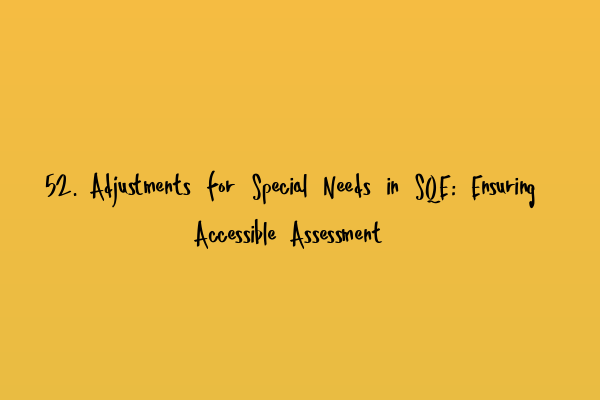52. Adjustments for Special Needs in SQE: Ensuring Accessible Assessment
Welcome to this blog post on the topic of adjustments for special needs in the SQE exam. In this article, we will explore the importance of ensuring accessible assessments for all candidates, irrespective of their special needs or disabilities. We will discuss the steps taken by the SQE Exam Law to accommodate these needs and provide an inclusive testing environment. Let’s dive in.
Understanding Special Needs and Accessibility
Special needs refer to requirements and accommodations necessary for individuals with disabilities to have equal access to education, employment, and other activities. Accessibility, in the context of the SQE exam, means providing reasonable adjustments to ensure that individuals with special needs can effectively demonstrate their legal knowledge and skills.
It is essential to acknowledge that everyone’s learning styles and abilities differ. Therefore, it is crucial to create an inclusive environment that caters to the diverse needs of all individuals.
Commitment to Equal Opportunities
The SQE Exam Law is committed to promoting equal opportunities for all candidates. This commitment extends to individuals with special needs, ensuring that they have a fair chance to showcase their legal abilities through the SQE exam.
The SQE Exam Law understands that every candidate is unique, and their potential should not be limited by disability or special needs. By providing reasonable adjustments, the SQE Exam Law aims to level the playing field and allow all aspiring solicitors to participate fully in the assessment process.
Reasonable Adjustments for Special Needs
In line with its commitment to accessibility, the SQE Exam Law offers a range of reasonable adjustments for candidates with special needs. These adjustments are designed to accommodate various disabilities or learning difficulties, allowing candidates to showcase their legal skills without facing unnecessary barriers.
Some of the reasonable adjustments provided by the SQE Exam Law include:
- Extra time: Candidates with specific needs may require additional time to complete the exam. The SQE Exam Law allows for additional time to be granted, ensuring that candidates have sufficient time to demonstrate their understanding and expertise.
- Accessible formats: The SQE exam materials can be provided in alternative formats such as braille, large print, or electronic versions, enabling candidates with visual impairments or dyslexia to access the content effectively.
- Assistive technology: Candidates may be allowed to use assistive technology or software during the exam to facilitate their understanding and response creation process, ensuring a fair assessment.
- Alternative venues: The SQE Exam Law offers alternative venues for candidates who require special facilities or equipment due to their disability. These venues are selected to ensure that candidates can access the necessary resources and complete the exam comfortably.
These reasonable adjustments are assessed on an individual basis, taking into consideration the specific needs of each candidate. The SQE Exam Law prioritizes confidentiality and ensures that candidates’ requests and information are handled with the utmost care.
How to Request Reasonable Adjustments
If you are a candidate with special needs and require reasonable adjustments for the SQE exam, it is essential to make a formal request to the SQE Exam Law. The process for requesting reasonable adjustments is straightforward and confidential.
To request reasonable adjustments, you should:
- Inform the SQE Exam Law about your special needs: Provide detailed information about your disability or special needs when registering for the SQE exam.
- Submit supporting documentation: Include relevant medical or diagnostic documentation that confirms your special needs and the recommended adjustments.
- Follow the SQE Exam Law’s guidelines: Review the SQE Exam Law’s guidelines for candidates with special needs and follow the instructions for making a formal request.
- Submit your request within the specified timeframe: Ensure that you submit your request for reasonable adjustments within the designated timeframe specified by the SQE Exam Law.
By following these steps, you can ensure that your request for reasonable adjustments is processed promptly and efficiently.
Promoting Inclusive Legal Practice
Providing reasonable adjustments for special needs in the SQE exam is not just an obligation but also an opportunity to foster a more inclusive legal profession. Diversity and inclusion are crucial in the legal field, as they enhance the quality of legal services and the overall justice system.
By accommodating candidates with special needs, the SQE Exam Law is taking strides towards incorporating a diverse range of voices and perspectives within the legal profession. This inclusivity will undoubtedly contribute to the overall effectiveness, understanding, and ethical practice of law.
Conclusion
In conclusion, the SQE Exam Law recognizes the importance of ensuring accessible assessment for all candidates with special needs. Through the provision of reasonable adjustments, the SQE exam creates a fair and inclusive environment that allows individuals to demonstrate their legal knowledge and skills.
By guaranteeing equal opportunities, the SQE Exam Law aims to create a legal profession that celebrates diversity and promotes inclusivity. If you have special needs and are planning to take the SQE exam, it is crucial to familiarize yourself with the process of requesting reasonable adjustments.
For more related articles on legal ethics, criminal defense, police procedures, and success in criminal law, check out the following resources:
- Professional Conduct in Criminal Practice: Upholding Ethics and Integrity
- Ethical Challenges in Criminal Defence: Navigating Gray Areas
- Understanding Police Procedures in the UK: A Comprehensive Guide
- Excelling in the SQE: A Blueprint for Success in Criminal Law
- From Study to Practice: SQE Criminal Law and Beyond
Remember, your special needs should never limit your potential as a solicitor. The SQE Exam Law is here to support and accommodate you on your journey to becoming a successful legal professional.
